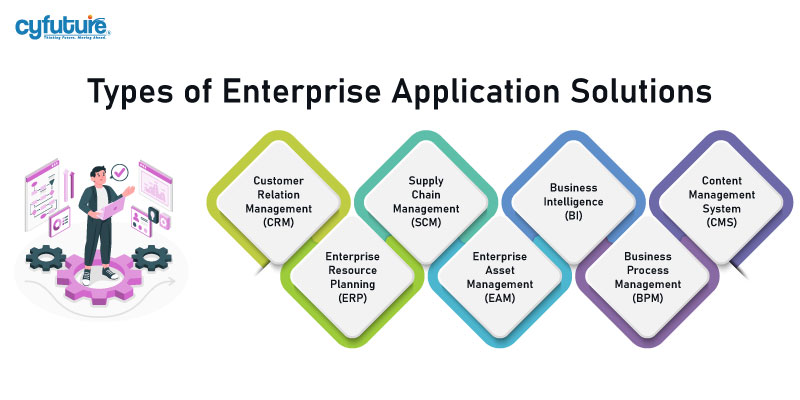Toggle navigation

Do you have a business that is growing and wants to leverage the power of an enterprise application? If yes, then stay tuned as this blog will uncover the role of enterprise application development in revolutionizing today’s digital era. There is no doubt that a business comprises various departments and teams working in sync with each other. Without seamless coordination and synchronization, organizations can face various challenges in managing their daily operations. Furthermore, their overall productivity could also get impacted. This may not pose a challenge for small organizations, but for larger organizations, having a centralized system or application is pivotal.
This is exactly where enterprise applications come into the picture. The field of enterprise application development is essential in the rapidly evolving commercial and technological landscape. It serves as the foundation of modern enterprises, encouraging consumer appeal, innovation, and productivity. Enterprise application development develops custom software programs that are made to fit the particular requirements of every company. These programs integrate with current systems with ease and produce a unified online presence. We will delve into more details of how enterprise application development proves to be an asset in this blog.
Before digging into the specifics, it is essential that we understand the fundamentals of enterprise application development and understand the scope and presence of enterprise applications.
Enterprise application development, or EAD for short, is the process of creating software applications specifically created and tailored to meet the unique needs of businesses. Systems for customer relationship management (CRM) and enterprise resource planning (ERP) are examples of these applications. These applications are considered as the foundation of contemporary businesses. EAD encompasses creating, developing, and managing these applications to guarantee a smooth transition with current systems, promoting productivity, creativity, and competitiveness. By automating procedures, gaining real-time insights, and improving overall efficiency, this method helps firms shape the future of corporate operations in the ever-changing business and technological world.

An Enterprise Resource Planning or ERP application majorly collates all the organizational data into a single system and divides them into various modules as per the function. It forms a simpler network that forms across multiple departments. Through this, everyone in the organization can operate off of a single database and receive real-time changes. These systems are often designed around the customer relationship module, which may include supply chain, procurement, warehouse management, and HR/labor management, depending on the industrial sector.
In simple terms, supply chain software manages the movement of products and services inside supply chain networks, which includes the movement of both packaged and raw materials. The entire process of monitoring the workflow from the point of product creation to the point of delivery is called supply chain management. With the help of these applications, businesses can significantly increase profitability, optimize supply chain operations, and track marketing and sales KPIs. Logistics and supply chain management are a blessing for companies like retail and e-commerce since they assist in developing long-term company plans.
An Enterprise Content Management Software enables a complete business to effectively store, organize, and retrieve its material. In an ECM the storage and access of both organized and unstructured material are possible. Additionally, ECM complies with the requirement by digitally safeguarding content as well. In addition, this corporate software has version control capabilities, allowing users to retrieve previous versions of documents when needed, with little danger to the security of the content while it is moved.
Business process automation is a prominent corporate software system that comes in high demand. This business system is a bit of a technical process that focuses on automating and optimizing ongoing tasks within your company. These kinds of corporate software often simplify, save operating expenses, boost productivity, and enhance service delivery. This software may automate a variety of routine tasks, including website maintenance, client management, marketing, and customer service.
HR experts may accelerate internal operations and automate numerous administrative and HR activities with the help of HRM, an enterprise software. The features that are offered are combined into a single module to facilitate decision-making and general management. It includes common HRM capabilities including a timesheet, employee assessments, recruiting, and a database for employee records. This module can also include performance reviews and payroll systems; it can be additionally coupled with the finance module to handle salaries, benefits, and travel expenditures. In addition to simplifying the work of the HR department, HRM also plays a role in closing the communication gap between HR and workers.
CRM, or customer satisfaction, is a common function in businesses that deal directly with customers. Undoubtedly, customer relationship management software is an advanced instrument for handling customer information, including any component that can be utilized for cross-selling, upselling, or other business-supporting activities at all levels. CRM works like the brain of a business, supporting accurate data management across the board and exceptional commercial results.
There will be probable chances that your company is expanding its market and growing its operations to become international. There are other duties that go into accepting globalization in addition to routine operations. As a result, in order to accelerate corporate growth, companies must streamline their operations, encourage expansion, and stay abreast of emerging market trends. Adding enterprise application integration to your company will help you improve operations and business processes so you can concentrate on your core competencies while planning for the future of your firm. These enterprise solutions will upgrade your traditional system and transform it into cutting-edge corporate apps that guarantee superior performance and a competitive advantage in the market. Furthermore, it will enable your organization to be optimized if you want it to differentiate itself from competitors.
As your company expands, the management and storage of data steadily increase. To evaluate the correct data and make decisions based on the results, this extraordinary expansion in data requires equal attention and careful management. Businesses may benefit from enterprise software provided they know how to use it effectively. You receive a single, centralized foundation for process monitoring when you adopt an Enterprise suite across agencies. Because an enterprise framework has a central source of information, it can readily provide useful reports and analytics at any moment. Your company may easily examine and compare features across many platforms with this software solution.
One of the major uses and benefits of enterprise application services is to automate tedious and time-consuming operations. Furthermore, you can readily automate the procedures in your company based on the time and effort they require from you. The main advantage of creating enterprise apps is time savings, which allows companies to concentrate on core competencies. To enable your company to carry out these responsibilities, your enterprise application integration will transform manual operations into automated ones. This is one of the major factors that differentiate enterprise software from other types of software.
Enterprise applications are highly efficient and they usually reduce staff turnaround times and commitment levels. When implemented correctly, an ERP strategy will greatly reduce or eliminate needless manual tasks, freeing up team members to focus on tasks that generate income. The adoption and use of best-practice protocols by the industry will also be assisted by this strategy. Furthermore, integrating cutting-edge technologies like analytics, AI-enabled solutions, and robotic process automation (RPA) into the ERP system increases the efficiency of corporate applications. Enterprise application integration provides automated and intelligent software solutions, enhancing the entire legacy system.
In any organization, various process management procedures will make use of enterprise applications. This covers anything from monitoring a single procedure to handling operations, finance, and several other various tasks. Enterprise software pre-compiles all security settings that ultimately guard your company against any hazardous viruses that could infiltrate the program and manipulate data. Thus, businesses can operate with confidence and no fear of data leakage, thanks to dedicated security resources spread over numerous servers.
The modular and adaptable structure of today’s workplace apps is one of its most significant advantages. In this setup, the enterprise application development services configure each application to function both independently and in concert with the other applications in the suite, seamlessly meeting specific market demands. Consequently, the developers will have the ability to select the regions in which they wish to grow and concentrate on those specific components to function. While some modern organizations want to concentrate just on online and desktop services, others may choose to improve both web and mobile applications.
The exceptional user experience is well recognized in the enterprise application development solution. The simplified use experience further enhances the functionality of the application and raises its adoption rate inside the organization. From providing cutting-edge features like in-app alerts, offline capabilities, and cross-platform compatibility to maintaining responsiveness, it is incredibly user-friendly. Moreover, a responsive design enables a single design to be readily adjusted to different screen sizes. The users will thus have a great experience regardless of the type of gadget they use.
To conclude, enterprise application development is revolutionary for companies of all kinds. These applications serve as digital architects for expanding businesses, encouraging cooperation, increasing productivity, and guaranteeing smooth operations. The market for business applications is expected to develop significantly, as the statistics clearly show. Enterprise apps provide a safe environment for data management in addition to process optimization. They create solutions that drive organizations into the future, from automation to scalability. Enterprise apps are the engines propelling organizations toward success in today’s changing digital world with increased productivity. Additionally, they offer an intuitive user experience and the potential for a competitive advantage. So don’t wait further, boost your business by embracing innovation and developing corporate applications.
FAQs
Q What is the difference between enterprise applications and normal applications?
Answer: Enterprise apps handle complex needs such as resource planning and ensure the smooth functioning of departments. On the other hand, ordinary apps, also known as consumer apps, assist individual users with daily chores. Consumer applications focus on the user, whereas enterprise apps, may have sophisticated features that aim to maximize organizational productivity. Their size, complexity, and emphasis on business-related tasks distinguish enterprise apps from more casual ones meant for personal use.
Q What are the drawbacks of enterprise application development?
Answer: Enterprise application development has drawbacks such as possible complexity, long development cycles, and large upfront expenses. Customization might cause problems with current systems’ compatibility. Adopting new methods is frequently met with opposition from users. Changing corporate demands give rise to issues in maintenance. Furthermore, linked systems may give rise to security issues. It’s critical to strike a balance between standardization and customization to keep the system from becoming overly complex.
Q What happens to the enterprise application if there is a downtime?
Answer: A company’s program encounters interruptions during downtime, which results in stopped or limited operation. Users could have trouble utilizing important functions, which would reduce productivity. Various factors, including technical errors, resource utilization, maintenance, or cyber-attacks, can cause downtime. Business disruptions, monetary losses, and reputational harm to the company are among the repercussions. Businesses frequently use disaster recovery plans, backup systems, and proactive monitoring to reduce downtime on their applications.
Leave a Reply